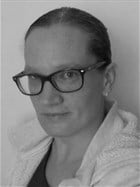Born and raised in the East London township of Mdantsane, Bukhobethu Matyeni pursued an education in law because of the social injustices she witnessed as a child. Today, the University of the Western Cape law graduate is an associate in the employment and public law practice of Herold Gie Attorneys.

Bukhobethu Matyeni, Associate in the employment and public law practice of Herold Gie Attorneys
"Growing up, I could only see black female attorneys on television," says Matyeni. "However, during a vacation programme at a law firm for a Grade 11 Life Orientation project, I had the opportunity to see confident black female attorneys in person. From that day forward, I aspired to be like those women."
During her studies at UWC, Matyeni joined the Black Lawyers' Association and served on its executive committee. She was also part of the Street Law programme, as well as a member of the Women's Pioneer Programme (WPP). Funded by the Norwegian embassy, the WPP's objective is to provide female LLB students with exposure to practical aspects of law, leadership skills and mentoring opportunities.
This Youth Month, we chat with Matyeni about the responsibilities of born-frees to honour the legacy of previous generations by inspiring the next, and "ubomi ngumzamo"...
What is the significance of Youth Day to you, as a young attorney?
Youth Day inspires me to advocate for change within the legal system and to ensure that the rights and freedoms fought for by previous generations are upheld and advanced. It also reinforces my commitment to being a role model for young people in my community, showing them that they can achieve their dreams and make a difference, just as I was inspired by the Black female attorneys I met during my high school years.
What does it mean to you to be ‘born-free’?
Being 'born-free' means growing up in a post-apartheid South Africa, free from the institutionalised racial segregation and oppression that defined previous generations.
For me, it represents the opportunity to live in a society that aspires towards equality, justice, and democracy. It means having the freedom to pursue my education, career, and personal goals without the limitations imposed by apartheid.
As a young attorney, being born-free also comes with a responsibility. It reminds me of the sacrifices made by those who fought for our freedom and the need to honour their legacy by working to address the ongoing social and economic inequalities in our country.
What do you feel is the most important right young people have today?
I believe the most important right young people have today is the right to education. Education is the foundation for personal development, empowerment, and social progress. It equips young people with the knowledge, skills, and critical thinking necessary to navigate and contribute to the world around them. Education has certainly changed the trajectory of my life.
What is one of the liberties you are grateful for today that weren't available to - or were hard-won by - earlier generations?
One of the liberties I am most grateful for today is the right to pursue a career of my choosing, regardless of my race or gender. Earlier generations, particularly under apartheid, faced severe restrictions and discrimination that limited educational and professional opportunities for Black South Africans and women.
This right, which was hard-won through the sacrifices and struggles of those who fought against apartheid, has allowed me to become an attorney and pursue my passion for justice and equality. It represents not only personal freedom but also progress towards a more inclusive and equitable society.
Why is it so important for the youth of today to get involved in societal change?
It is crucial for the youth of today to get involved in societal change to address issues. The youth are often the most affected by current issues such as unemployment. Their direct involvement ensures that their specific needs and concerns are addressed.
Older generations often comment that the youth today "have it easy", but it's not necessarily true. What are some of the challenges youth are currently experiencing that other generations might not understand?
Some of the issues that young people face today include high unemployment rates, rising costs of education and a higher prevalence of conditions like anxiety, depression, and stress among young people.
Share one piece of advice given to you by an elder...
My mother always says "ubomi ngumzamo", which loosely translates to "life is about trying".


































